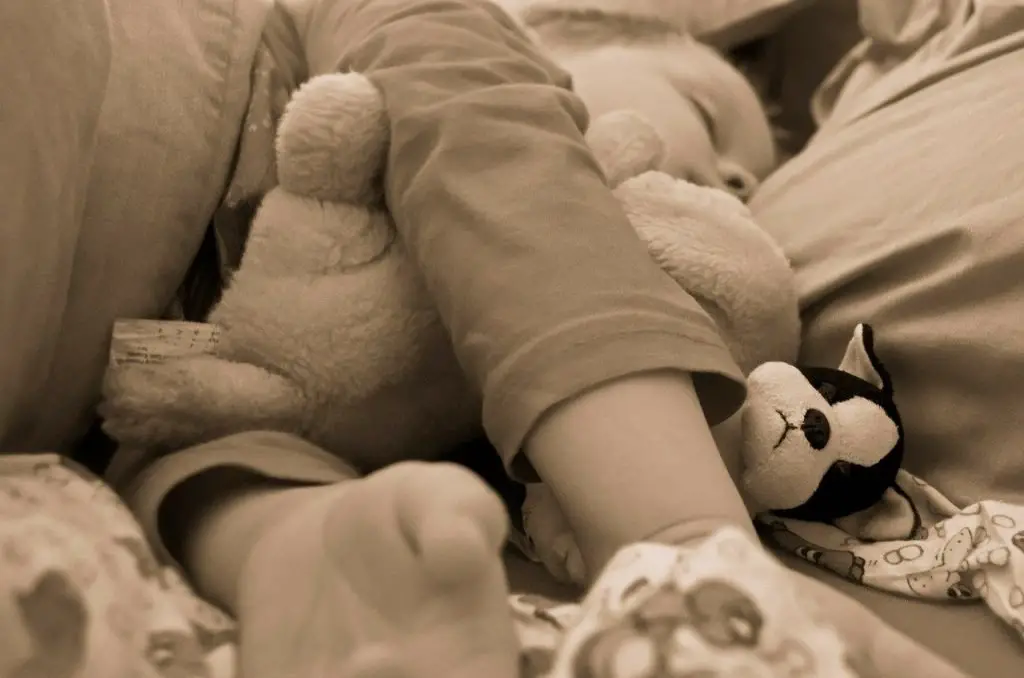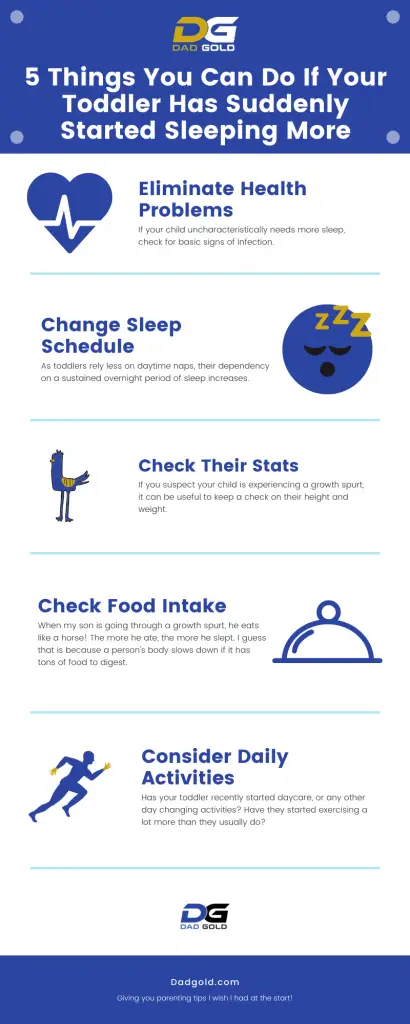As a rule, toddlers need between 12 and 14 hours of sleep a day, including daytime naps, so if your toddler has suddenly started sleeping more, it may cause frustration and worry for parents.
It’s much less common to hear dads complaining that their toddler is sleeping too much.
Many parents would celebrate some extended peace!
Instead of an untimely interruption during knife-edge stoppage time, a rare chance to actually sit down to eat dinner or, even rarer, quality time with their partner.
When it comes to toddler sleep, is it possible to have too much of a good thing?
If your toddler has suddenly started sleeping more, should this be a cause for concern?
Reasons Why Your Toddler Is Suddenly Sleeping More

A sleepy toddler who is difficult to rouse or take advantage of longer daytime naps may need more rest for different reasons, so let’s look.
Growth Spurt
A sudden need for more sleep is a common sign that your child is doing what all children should: growing.
-

Bold Male Pride – Baseball Trucker Cap Celebrating Masculinity
£18.00 Select options This product has multiple variants. The options may be chosen on the product page -

Dad Bod Appreciation Gift Mug
£14.00 Add to cart -

Dad Bod, Bad Jokes Structured Baseball Cap
£22.00 Select options This product has multiple variants. The options may be chosen on the product page
While this is very true of babies, between 18 months and 4 years toddlers can also have periods of intense growth which, combined with superhero energy levels, mean their developing bodies need additional rest.
A growth spurt is often indicated by a voracious appetite or general aches and pains during the night.
Rest assured that a child who suddenly shoots up like they’ve been drinking Miracle-Gro behaves entirely normally.
Teething
Teething – that monstrous time that all children (and their parents) must tolerate when their first teeth begin to erupt – is most often associated with disturbed sleep patterns, as well as drooling, irritability, crying, and chewing on hard objects such as toys.
But many parents, anecdotally, report that their toddlers actually sleep more during episodes of teething, which can occur any time from 12 months, particularly if a low-grade fever occurs at the same time.
While many doctors argue that fever is not a sign of teething, millions of Dr. Googles (i.e., parents) would beg to differ. If you have a toddler sleeping more than usual, teething could be why.
Unwell
As most dads would agree, a dose of man-flu is guaranteed to bring on sleepiness. This is especially true if the alternative leaves the house at 6.30 am on an icy winter’s morning to tackle the commute to work.
Seriously though, many illnesses will induce sleep for a good reason for children.
While the human body is an expert at fighting unwanted intruders in the shape of bacteria and viruses, the immune system takes time to identify the pathogen and figure out an effective way to kill it.
During this time, a toddler may sleep more, allowing their body to form its defenses, while a temperature spike – the first weapon to destroy the bug – may also cause sleepiness.
5 Things You Can Do If Your Toddler Has Suddenly Started Sleeping More

Just a quick note: if you are ever concerned that your toddler may have a medical reason for sleeping more, then you should consult with a medical professional.
Remember that sleep is a natural response to different situations in a young child’s life, so let your toddler sleep and enjoy the moment if you are not too concerned!
However, the demanding routines of modern life rarely allow for such a laid-back approach (unfortunately), so the following tips will prove useful.
Eliminate Health Problems
If your child uncharacteristically needs more sleep, check for basic signs of infection. A fever is often the giveaway symptom that your toddler is brewing something, so take their temperature with a good thermometer and administer painkillers as necessary.
Avoid the temptation to wrap up a feverish child in a duvet, as this will drive their temperature even higher.
Check the common places for infection, such as the throat, for obvious signs of ill-health, and ask your child about pain in difficult-to-spot places, such as the ears or when they pass water.
Ensure they drink plenty of fluid and, if in doubt, seek professional medical advice.
Teething is also a health-related issue that might be why your toddler has suddenly started sleeping more.
Change Sleep Schedule
As toddlers rely less on daytime naps, their dependency on a sustained overnight period of sleep increases. If naps start to lengthen, you may find that your child is reluctant to go to bed in the evening, has less restful sleep, or wakes early the following day.
In this situation, try to reduce your toddler’s daytime naps as much as possible, even if you must deliberately wake them.
Stimulation, with attention-grabbing and enjoyable activities, can also help to discourage them from napping. This will help your child settle more quickly in the evening, at an earlier time, so they (and you) can enjoy a long night-time sleep that has them fully recharged for the next day.
A change to the sleep schedule will mean that your toddler is ready to wake early so that daily routines can be adhered to without delaying you or your partner on your way to work.
Check out this sample sleep schedule for 2-year-old kids; it will help you if you have a 2-year-old sleeping more than usual.
Check Their Stats
If you suspect your child is experiencing a growth spurt, it can be useful to keep a check on their height and weight.
To do this accurately, the measurements should be carried out using a stadiometer and professionally calibrated scales, but the chances are you don’t have these tucked in your understairs cupboard.
Tons of places have a height and weight check area, or with a bit of clever thinking, you can obtain approximate measurements at home or somewhere near. As always, if you have any concerns, seek professional medical advice.
A growth spurt is not a long-term change, so just when you’ve got used to your child having longer sleep, she’ll be bouncing around just as the sun rises and you’ll feel that you’re back to square one!
Check Food Intake
When my son is going through a growth spurt, he eats like a horse!
The more he ate, the more he slept. I guess that is because a person’s body slows down if it has tons of food to digest.
I noticed this when he was a baby too. As soon as we moved him onto solids, he slept through the night. Ahh…I remember it well!
If you are concerned that your toddler is suddenly sleeping more, it is worth checking their daily food intake to see if it has changed recently.
Consider Daily Activities
Has your toddler recently started daycare or any other day-changing activities? Have they started exercising a lot more than they usually do?
When my son started going to daycare, his sleep pattern changed drastically. I would lay him down at night, and he would go straight to sleep. He no longer woke up to get in our bed during the night. He stayed asleep until a decent time! It was bliss…
At what age do toddlers have growth spurts?
From the moment they are born, kids go through growth spurts at regular intervals. There are no hard and fast rules about when these happen or how often they happen.
Just assume that if your toddler is eating more and suddenly starts sleeping more, they could be having a growth spurt!
Should my toddler be napping during the day?
It is entirely up to you (actually, mostly your toddler). Over a period of around 1 year, my son stopped his morning nap and his afternoon nap.
You should check for signs that your toddler is ready to stop napping and alter their sleep schedule to accommodate.
Is it normal for toddlers to sleep a lot?
It is during times when they are sick or going through a growth spurt. Usually, this is absolutely nothing to be concerned about; however, if it continues for an extended period of time and you are worried, you should seek medical advice.
It could just be that your toddler likes sleeping!
Conclusion
If your toddler has suddenly started to sleep more, it could be for several different reasons. Life is tough at this stage of their lives.
They are growing quickly, occasionally teething, running ALL THE TIME. It is tiring, and sometimes a toddler needs to sleep more.
Keeping a toddler’s sleeping schedule is vital, but sometimes this needs to be adjusted on the fly. You are aiming at a moving target, so roll with the changes.
Sleeping longer is almost always a temporary situation. If you’ve ruled out illness and your child seems otherwise healthy with no signs of developmental delays or growth problems, enjoy the silence!
Because, as most parents know, children are unpredictable. In no time, you’ll probably be wishing they slept that little bit longer.
Good luck!


